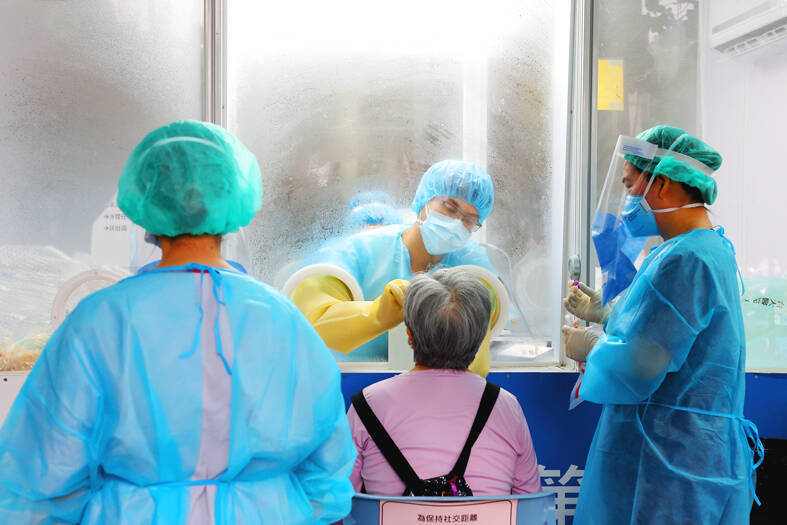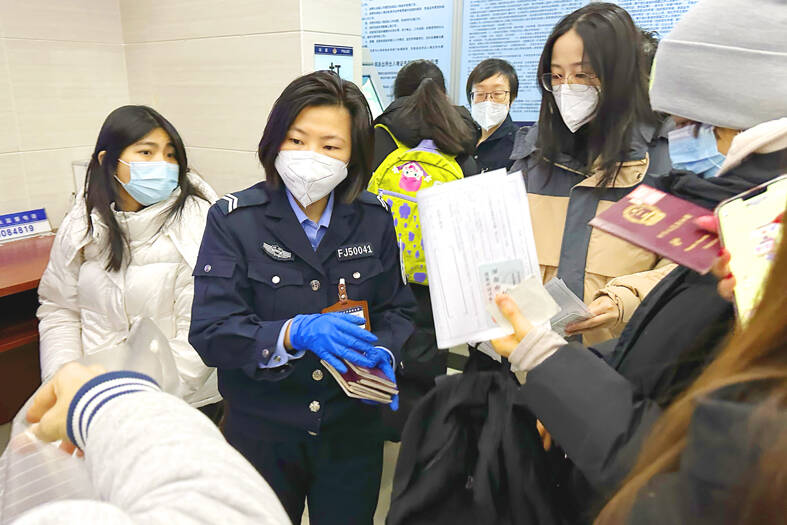Starting on Sunday, travelers from China will be required to take a polymerase chain reaction (PCR) test upon arrival in Taiwan, the Central Epidemic Command Center (CECC) said yesterday, as it reported 27,942 new local cases.
The Chinese National Health Commission on Monday announced that it would drop quarantine requirements for inbound travelers from Jan. 8. It also removed restrictions on the number of international flights and passenger capacity, and said that people with COVID-19 would no longer need to self-isolate.
Following the announcement, governments across the world started implementing measures to test or restrict travelers from China.

Photo: CNA
Japanese Prime Minister Fumio Kishida on Tuesday said that starting at midnight tomorrow, travelers from China or those who have been in China within the previous seven days would be subject to a mandatory COVID-19 test upon arrival. Those who test positive would be quarantined for seven days. Direct flights from China, Hong Kong and Macau would be allowed to depart from and land at only four airports in Japan.
The US government is considering imposing new COVID-19 measures on travelers to the US from China, Reuters reported yesterday.
Malaysia has imposed new tracking and surveillance measures.

Photo: AP
India began random testing of about 2 percent of passengers arriving from other countries at all international airports a week ago to minimize the risk of any new variant entering the country.
Philippine Secretary of Transportation Jaime Bautista yesterday called for COVID-19 measures, including testing of inbound travelers from China.
“We should be very cautious, because if they have a lot of COVID cases, we should be careful about Chinese visitors coming into the Philippines,” he told reporters.
At an enlarged Cabinet meeting yesterday morning, Premier Su Tseng-chang (蘇貞昌) said that Taiwan generally has not allowed Chinese travelers into the nation since the pandemic began, but more than 30,000 people are expected to arrive from China during the Lunar New Year holiday.
Su said that as some countries have taken action, he has instructed the CECC to implement preventive measures.
Deputy Minister of Health and Welfare Victor Wang (王必勝), who heads the center, in the afternoon said that from Sunday to Jan. 31, travelers from China — either on direct flights from four Chinese cities, or on ferries or flights through the “small three links” to the outlying counties of Kinmen or Lienchiang — would have to show a negative PCR test result upon arrival.
The direct flights from China do not include those from Hong Kong and Macau, and travelers do not include airline crew members, the CECC said.
Wang said inbound travelers need to practice seven days of self-disease prevention even if they test negative.
Those who test positive would be subjected to the “5+n” rule — five days of home isolation, followed by up to seven days of self-health management until they test negative with a rapid test.
Virus samples would be taken from travelers who test positive and sent to the Centers for Disease Control’s (CDC) laboratory for genome sequencing, in a bid to detect possible mutations in SARS-CoV-2 strains, he added.
People undergoing seven days of self-disease prevention must take a rapid test on the day of arrival or the first day of self-disease prevention, the CECC said.
They also must take a rapid test if they develop symptoms and must test negative in a rapid test two days prior to leaving home.
The Cabinet implemented the policy due to a lack of data transparency amid a COVID-19 surge in China, Wang said, adding that inbound travelers should seek medical attention as soon as possible if they develop symptoms.
The CECC yesterday also reported 27,942 new local cases, up 46.7 percent from Wednesday last week, 226 imported cases and 25 deaths.
Wang is tomorrow to travel to Lienchiang to meet with County Commissioner Wang Chung-ming (王忠銘) to better understand the outlying county’s healthcare capacity, as well as its testing and quarantine preparations, the CECC said.
Additional reporting by Bloomberg

MAKING WAVES: China’s maritime militia could become a nontraditional threat in war, clogging up shipping lanes to prevent US or Japanese intervention, a report said About 1,900 Chinese ships flying flags of convenience and fishing vessels that participated in China’s military exercises around Taiwan last month and in January have been listed for monitoring, Coast Guard Administration (CGA) Deputy Director-General Hsieh Ching-chin (謝慶欽) said yesterday. Following amendments to the Commercial Port Act (商港法) and the Law of Ships (船舶法) last month, the CGA can designate possible berthing areas or deny ports of call for vessels suspected of loitering around areas where undersea cables can be accessed, Oceans Affairs Council Minister Kuan Bi-ling (管碧玲) said. The list of suspected ships, originally 300, had risen to about 1,900 as

Japan’s strategic alliance with the US would collapse if Tokyo were to turn away from a conflict in Taiwan, Japanese Prime Minister Sanae Takaichi said yesterday, but distanced herself from previous comments that suggested a possible military response in such an event. Takaichi expressed her latest views on a nationally broadcast TV program late on Monday, where an opposition party leader criticized her for igniting tensions with China with the earlier remarks. Ties between Japan and China have sunk to the worst level in years after Takaichi said in November that a hypothetical Chinese attack on Taiwan could bring about a Japanese

MORE RESPONSIBILITY: Draftees would be expected to fight alongside professional soldiers, likely requiring the transformation of some training brigades into combat units The armed forces are to start incorporating new conscripts into combined arms brigades this year to enhance combat readiness, the Executive Yuan’s latest policy report said. The new policy would affect Taiwanese men entering the military for their compulsory service, which was extended to one year under reforms by then-president Tsai Ing-wen (蔡英文) in 2022. The conscripts would be trained to operate machine guns, uncrewed aerial vehicles, anti-tank guided missile launchers and Stinger air defense systems, the report said, adding that the basic training would be lengthened to eight weeks. After basic training, conscripts would be sorted into infantry battalions that would take

DEEP-STRIKE CAPABILITY: The scenario simulated a PLA drill that turned into an assault on Taiwan’s critical infrastructure, with the launchers providing fire support Taiwan yesterday conducted this year’s first military exercises at Longsiang Base in Taichung, demonstrating the newly acquired High Mobility Artillery Rocket System’s (HIMARS) ability to provide fire support and deep-strike capabilities. The scenario simulated an attack on Penghu County, with HIMARS trucks immediately rolling into designated launch areas and firing barrages at the Wangan (望安) and Cimei (七美) islands, simulating the provision of fire support against invading forces. The HIMARS are supposed to “fire and leave,” which would significantly increase personnel and equipment survivability, a military official said. The drill simulated an exercise launched by the Chinese People’s Liberation Army (PLA) Eastern